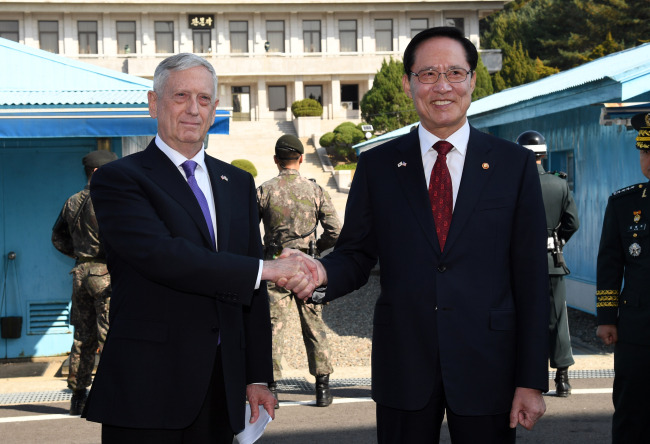Our goal is not war: allies' defense chiefs
US, Korea defense chiefs stress diplomacy to resolve nuclear standoff with NK
By Yeo Jun-sukPublished : Oct. 27, 2017 - 20:01
The South Korean and US defense chiefs on Friday expressed their commitment to a diplomatic solution to resolving the nuclear standoff with North Korea, saying their goal is to achieve the complete nuclear disarmament of the North, not to pursue another war on the Korean Peninsula.
During their visit to the Demilitarized Zone that divides the two Koreas, Defense Minister Song Young-moo and his US counterpart James Mattis urged North Korea to suspend reckless provocations and immediately return to denuclearization talks.
“As US Secretary of State (Rex) Tillerson has made clear, our goal is not war, but rather the complete, verifiable and irreversible denuclearization of the Korean Peninsula,” Mattis said during the press conference at the truce village of Panmunjom inside the DMZ.
During their visit to the Demilitarized Zone that divides the two Koreas, Defense Minister Song Young-moo and his US counterpart James Mattis urged North Korea to suspend reckless provocations and immediately return to denuclearization talks.
“As US Secretary of State (Rex) Tillerson has made clear, our goal is not war, but rather the complete, verifiable and irreversible denuclearization of the Korean Peninsula,” Mattis said during the press conference at the truce village of Panmunjom inside the DMZ.

Their visit to the heavily fortified buffer zone came amid heightened tensions on the peninsula, with the North renewing its threat to test a hydrogen bomb over the Pacific Ocean and US aircraft carrier strike groups scrambling to the waters near South Korea.
Referencing their latest meeting for ASEAN Defense Ministers’ Meeting in the Philippines, Mattis said the allies’ defense chiefs made clear “mutual commitment” to a diplomatic solution to address North Korea‘s “reckless, outlaw behavior.
While sending a strong warning against the North’s nuclear ambition, South Korean Defense Minister Song urged North Korea to accept Seoul’s proposal of resuming an inter-Korean talk aiming to denuclearize the North.
“North Korea’s nuclear weapons and missiles are something that they would never use. If the North were ever to use them, I can guarantee you that South Korea and the US’ combined military capabilities would deliver retaliation.”
Making his second trip as Pentagon chief to South Korea ahead of President Trump’s scheduled visit to Seoul on Nov 7, Mattis also met with South Korea’s President Moon Jae-in before attending an annual Security Consultative Meeting on Saturday.
During the meeting in presidential office Cheong Wa Dae, Moon asked Mattis to support US commitment of expanding deployment of strategic assets here, describing it as “strong and substantial” deterrence against North Korea nuclear and missile threat.
Moon and his US counterpart Donald Trump agreed in September to expand the deployment of US strategic asset and strengthen the allies’ defense capabilities by allowing Seoul to acquire US advanced military assets and develop its own advanced equipment.
“US deployment of strategic asset works as strong and substantial deterrence against North Korea’s provocations,” said Moon. “I want to offer my appreciation that such efforts are giving a great hope to our people who are concerned about our security conditions.”
Describing the South Korea-US alliance as being built on “mutual trust” and forged through life-and-death battles during the Korean War, Mattis reiterated Washington’s security commitment and pledged to defend Seoul against the North’s persistent nuclear ambition.
Before heading to Cheong Wa Dae following his return from the DMZ, Mattis addressed South Korea and US troops at Yongsan garrison in Seoul, saying the combined military presence is key to supporting a diplomatic approach to North Korea.
While advocating the Trump administration’s push for a diplomatic solution, Mattis has also emphasized that the US is prepared to take military action if the North doesn’t halt its development of missiles that could strike the mainland United States.
”Ultimately our diplomats have to be backed up by strong soldiers, sailors, airmen and marines,“ he said in impromptu remarks. ”You just keep working together and show the world we can do it and we‘ll buy time for our diplomats to solve this problem, OK?“
At the heavily-guarded DMZ, Mattis visited a US-South Korean military observation post that can peer into North Korea’s territory. There, he was briefed on conditions along the border and the history of Korean War battles fought along the DMZ.
Facing away from North Korea’s territory inside the DMZ, Mattis said the border zone delivers stark contrast between the prosperous South and the oppressive North, accusing the communist country of threatening regional and world peace “with catastrophe.”
“The visit today in this Demilitarized Zone portrays in very strong terms the difference we see between the two nations. To the south lies a vibrant country, a vibrant economy of a free country underpinned by peace-loving members of a free society.”
“Behind me to the north, an oppressive regime that shackles its people, denying their freedom, their welfare, and their human dignity in pursuit of a nuclear weapon with means of delivery in order to threaten others with catastrophe.
By Yeo Jun-suk (jasonyeo@heraldcorp.com)


















![[Today’s K-pop] Treasure to publish magazine for debut anniversary](http://res.heraldm.com/phpwas/restmb_idxmake.php?idx=642&simg=/content/image/2024/07/26/20240726050551_0.jpg&u=)